 Petzlover
Petzlover Doxiepoo is originated from United States but Korean Mastiff is originated from South Korea. Doxiepoo may grow 51 cm / 20 inches shorter than Korean Mastiff. Doxiepoo may weigh 67 kg / 147 pounds lesser than Korean Mastiff. Doxiepoo may live 3 years more than Korean Mastiff. Both Doxiepoo and Korean Mastiff has same litter size. Both Doxiepoo and Korean Mastiff requires Moderate Maintenance.
Doxiepoo is originated from United States but Korean Mastiff is originated from South Korea. Doxiepoo may grow 51 cm / 20 inches shorter than Korean Mastiff. Doxiepoo may weigh 67 kg / 147 pounds lesser than Korean Mastiff. Doxiepoo may live 3 years more than Korean Mastiff. Both Doxiepoo and Korean Mastiff has same litter size. Both Doxiepoo and Korean Mastiff requires Moderate Maintenance.
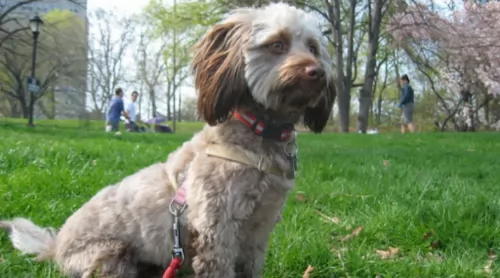 The Doxiepoo is a designer dog breed - a combination of the Dachshund who was used to hunt for Badgers and the Poodle, a dog bred in France to essentially be a lap dog. There is however some dispute as to whether the Poodle descends from Germany or from the French Barbet.
The Doxiepoo is a designer dog breed - a combination of the Dachshund who was used to hunt for Badgers and the Poodle, a dog bred in France to essentially be a lap dog. There is however some dispute as to whether the Poodle descends from Germany or from the French Barbet.
Wherever the parents hail from, the Doxiepoo hails from the United States of America.
With both the Poodle and the Dachshund being intelligent, fun and loving type of canines, the two of them together have brought out a wonderful hybrid pet in the Doxiepoo. Today, the Doxiepoo is bred with other Doxiepoos.
 This large breed dog is also known as the Mee Kyun Dosa. In spite of his huge size, he isn’t aggressive at all and is bred to be a companion dog.
This large breed dog is also known as the Mee Kyun Dosa. In spite of his huge size, he isn’t aggressive at all and is bred to be a companion dog.
He was originally developed to be a working dog. The dog was developed in the late 1800’s from European and Asian working breeds. Those interested in dog breeds suspected that a crossing of the Japanese Tosa-Inu with the Neapolitan Mastiff and the Dogue de Bordeaux brought about the breed. They also thought that the Saint Bernard and English Mastiff were brought in later on as well.
These large molosser dogs have been developed through years of inbreeding. It is one of the biggest dogs in Korea.
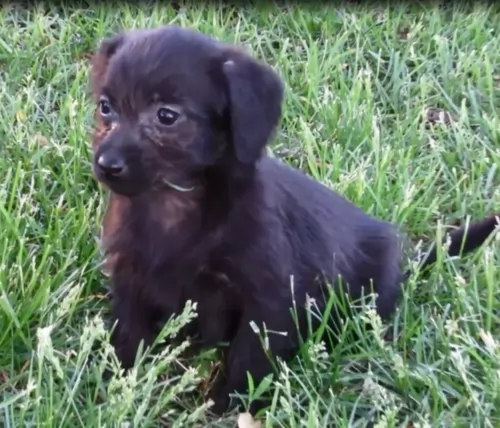 The Doxiepoo can range from being a small to medium sized dog, standing at anything between 20cm to 25cm in size and weighing between 3kg and 7kg, depending much on whether a standard, miniature or toy sized poodle was used in the breeding.
The Doxiepoo can range from being a small to medium sized dog, standing at anything between 20cm to 25cm in size and weighing between 3kg and 7kg, depending much on whether a standard, miniature or toy sized poodle was used in the breeding.
The Doxiepoo could look like either one of the two breeds, but he will have a strong, sturdy body with a curly or wavy coat of varying lengths and various colors - cream, black, tan, apricot, grey or white. The poodle side of him ensures he is a hypoallergenic dog.
Between the Dachshund and the Poodle, you’re going to get a wonderful array of characteristics as they both come with their strong points. Certainly you will be well entertained and amused by your pet, while he can also be useful as a watchdog.
Being a small dog, he will fit well into life in the city or in the countryside. He is as bright as a button and learns tricks and new skills quickly. With training and socialization he becomes obedient and well behaved wherever he is, getting on well with other pets in the home as well as with all children and adults.
The Doxiepoo is a lively, alert, energetic dog and will require being exercised – lots of ball games and a walk will keep him lean, muscular and content.
 You can’t help but stare at the Korean Mastiff because of his strong, muscular neck of loose skin that forms dewlaps. His face is wrinkled and he has a cumbersome, sluggish gait.
You can’t help but stare at the Korean Mastiff because of his strong, muscular neck of loose skin that forms dewlaps. His face is wrinkled and he has a cumbersome, sluggish gait.
He is a large dog standing at anything between 59 to 76cm in height, both male and female. He can weigh between 65 to 74kg. He is noticeable because of his fairly loose fitting coat, which is short and smooth and which is a rich, shiny reddish, orange or brown colour.
The nose of the dog is broad and dark, the ears soft and floppy and he has eyes which are set wide apart.
The Korean Mastiff is reserved with strangers but he is friendly and even tempered with his human family, making an ideal pet.
He is looked upon as a gentle giant, being an oversized playmate for children and he also tolerates other pets in the home.
He isn't an overly energetic dog, but that doesn't mean he shouldn't be exercised. He will need long walks to avoid him putting on weight.
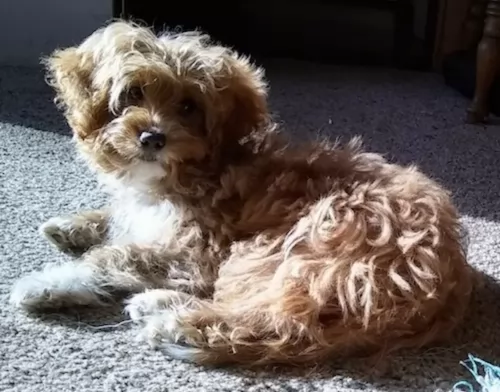 Every dog, even the little ones like this, will require some kind of input from you if you want to get the best from him. Every puppy bought as a gift when they’re cute and cuddly turns into an adult, and often the very person who received him as a gift, loses interest and neglects him. Then they wonder why the dog becomes irritating and destructive.
Every dog, even the little ones like this, will require some kind of input from you if you want to get the best from him. Every puppy bought as a gift when they’re cute and cuddly turns into an adult, and often the very person who received him as a gift, loses interest and neglects him. Then they wonder why the dog becomes irritating and destructive.
A dog is a long term investment and if you commit to your sweet Doxiepoo, you’ll get years and years of devoted friendship.
 Your huge Korean Mastiff is a good natured dog who isn’t aggressive. He loves being with his human family and makes a particularly good pet when he has been trained and socialized.
Your huge Korean Mastiff is a good natured dog who isn’t aggressive. He loves being with his human family and makes a particularly good pet when he has been trained and socialized.
He likes a firm but fair owner who takes a leader-of-the-pack role. In spite of his largeness and sluggishness, he can be quite agile and makes a good watchdog too.
All round, the Korean Mastiff, known as a gentle giant, is capable of making you a splendidly friendly, loving canine companion.
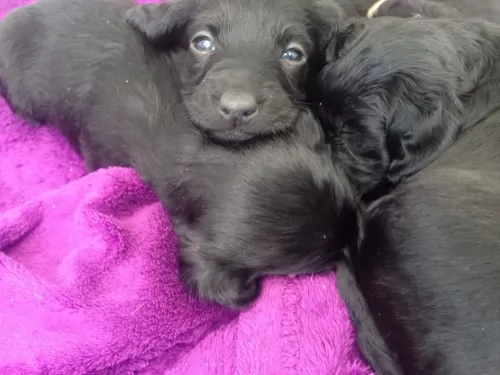 The life expectancy of the Doxiepoo is around 12-15 years of age if he is well looked after. He is a robust dog, but he can still face some health issues that both his parents contend with.
The life expectancy of the Doxiepoo is around 12-15 years of age if he is well looked after. He is a robust dog, but he can still face some health issues that both his parents contend with.
Just some of the diseases that the Doxiepoo might face while in your care are ear- and skin infections, dental disease, digestive tract problems, heart conditions and epilepsy. If you think your pet has any kind of illness, it is imperative to get him to the vet for a checkup.
Poodles, particularly are prone to skin disorders. They can be allergic to grass, parasites and food. If your Doxiepoo chews or licks his paws or some other area a lot, and the skin is red, he could have a skin allergy.
The vet will be able to diagnose your dog’s allergies with some skin- or blood testing. For instance, sebaceous adenitis is an inherited allergy that affects the lubrication of the skin and hair follicles. Symptoms of the disease include scaly skin, sore and even hair loss.
 Treat your big Mastiff dog like the wonderful fur-child he is and make sure your attend to all his medical needs to avoid pain and discomfort for him.
Treat your big Mastiff dog like the wonderful fur-child he is and make sure your attend to all his medical needs to avoid pain and discomfort for him.
Cherry eye is a fairly common health issue with this breed. It affects the tear gland of the third eyelid, and if left untreated, can lead to ongoing eye problems.
All dogs have a third eyelid, as well as two tear producing glands to lubricate the eyes. Its an important protective component to eye health in dogs. When the connective tissue that holds the gland in place is damaged or weak, there is a red protrusion of the gland from the lower eye. This is a congenital disorder. Don’t ignore it, but get your pet to the vet so you can catch it early.
Canine bloat, known as gastric dilatation and volvulus can be a killer disease for your pet, more so with deep-chested, large breeds.
Gas accumulation is known as bloat, and its the accumulation of gas which can cause the stomach to rotate. A dog can go into shock from bloat. The reason for this is that the stomach expands, putting pressure on veins. Blood can’t flow as it should and the blood supply gets cut off to the stomach.
Your dog could be vomiting, restless, the stomach hard and bloated or he may be drooling. Dogs who gobble their food down and eat just one large meal a day have an increased susceptibility to GDV than other dogs.
The wrong ingredients of a dog’s diet can also contribute to bloat. High quality food and feeding your pet smaller meals can help.
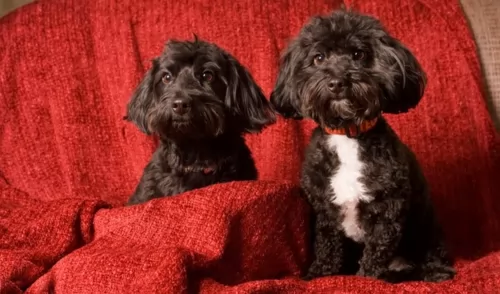 You can’t be sure what kind of coat your Doxiepoo will have but he will certainly require brushing at least twice a week. In some instances it may be wise to seek out the services of a professional groomer who does an excellent job of trimming the hair, cleaning the teeth, checking the ears and clipping the nails.
You can’t be sure what kind of coat your Doxiepoo will have but he will certainly require brushing at least twice a week. In some instances it may be wise to seek out the services of a professional groomer who does an excellent job of trimming the hair, cleaning the teeth, checking the ears and clipping the nails.
The Doxiepoo, just like any other dog, will need to be trained and socialized early as he is a stubborn dog and will need to be trained to be obedient. With this training and socialization, he becomes amicable around children and pets in the home. He learns easily too and this is what makes him a great pet for first time dog owners.
The Doxiepoo is a moderate energy dog, so he will do well on a walk every day. You can also make use of ropes, balls and frisbees to give him a bit of a workout in the garden.
He loves water too and will enjoy a run on the beach and cooling off in the ocean. He adapts easily to life in the city or in the country, so long as he is with his human companions.
The Doxiepoo will eat dry kibble, particularly if it is from the highest quality brands and chosen according to the dog’s size, age and activity levels.
Now and then you can add in a little bit of cooked rice, vegetables and chicken for variety. Some raw meat can play an important role in keeping the skin healthy and free from dryness and itchiness. Make sure that he always has fresh, cool water available to him.
 A Korean Mastiff is an easy dog to groom with his short smooth coat. He is a moderate shedder so a brush twice a week will be sufficient to maintain the shiny, smooth condition of his coat.
A Korean Mastiff is an easy dog to groom with his short smooth coat. He is a moderate shedder so a brush twice a week will be sufficient to maintain the shiny, smooth condition of his coat.
Because the dog has lots of skin and folds, these folds will need to be washed and kept clean as grime can collect.
While you're busy attending to his skin check his nails too and check inside and outside his ears for signs of redness and irritation.
Puppies use up more energy than mature adults, requiring a diet of good quality protein. Dogs that have been spayed or neutered will require less calories as will senior dogs.
Korean Mastiffs require high quality nutrition, and if its dry kibble, make sure its the best brand. Mix in some home-made food such as cooked chicken, brown rice and vegetables from time to time as well as some raw meat occasionally.
Protein and fat from good sources are top ingredients for your Korean Mastiff. Avoid food with allergens such as corn and wheat, sweeteners, preservatives and colorants.
Make sure your large pet has constant access to fresh water.